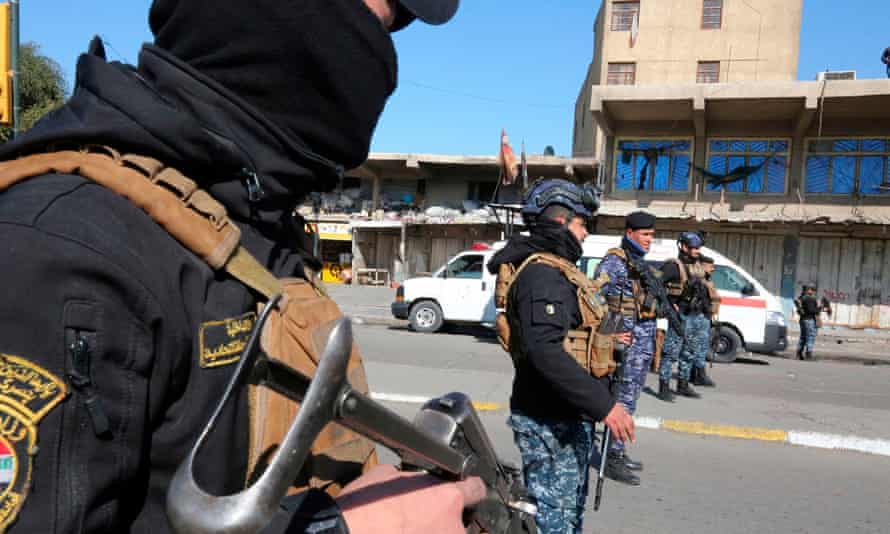Two suicide bombers have killed at least 32 people and wounded more than 100 at a Baghdad market by luring shoppers towards them before setting off the devices they were carrying.
The strike on Thursday was the first in the Iraqi capital in three years, provoking fears of a resurgence of the kind of violence the country endured in the years after the 2003 US invasion and the Islamic State era.
Dozens of civilians were wounded in the mid-morning blast at a secondhand clothes bazaar. The interior ministry said the first bomber had claimed he was ill and when crowds gathered to help, he detonated his bomb. “The second suicide bomber blew himself up when people gathered to move the wounded from the first explosion,” the ministry said.
The market had been teeming with people after the lifting of nearly a year of Covid-19 restrictions across the country.
Video footage of the second blast, uploaded to social media, depicted chaotic scenes on a street outside the market and a powerful explosion.
The ministry ordered the city’s hospitals, already overwhelmed by the coronavirus epidemic, to treat the wounded. Bodies lined a corridor of at least one central hospital.
Baghdad residents tried to track down relatives who may have died in the attack. “My brother is married and has two children. He went out this morning to earn a living for his little ones and now he’s nowhere to be found,” Abbas Samy, 25, told AFP.
While there was no immediate claim of responsibility, the strike bore the hallmarks of the Isis terror group, whose remnants had melted back into towns and cities after its defeat in Iraq and Syria in early 2019. Isis has been attempting to reorganise in Iraq’s western deserts and near its eastern border. Though its leadership and rank and file were decimated, it retains the capacity to launch small but devastating attacks.

At the height of Isis’s powers the terror group reached the approaches to Baghdad and was held back by a counter-offensive by militia groups and the Iraqi military, which had been splintered by Isis’s rapid gains. As the national military regrouped, Isis gradually withered, resorting to suicide bombings and killing officials. Since 2017 it has rarely been able to penetrate security cordons near central Baghdad.
Mazen al-Saadi, 34, said he was lucky to be alive. He was shopping in Tayaran Square with a good friend when the blasts ripped through the market around them.
“He was just a few metres in front of me. After the blast, he just vanished and I wasn’t able to find him – until now,” Saadi told AFP. After a few hours of searching, he had just located his friend’s body at the Sheikh Zayed morgue.
With a sense of bitter resignation, Saadi said he had anticipated a return to violence in his native Baghdad. “We were always thinking about the explosions coming back – we thought they could return at any moment, especially as the elections were getting closer,” he said.
President Barham Saleh led political figures in condemning Thursday’s attack, saying the government would “stand firmly against these rogue attempts to destabilise our country”.
Pope Francis, who hopes to visit Iraq in March, deplored the “senseless act of brutality”.
The United Nations’ Iraq mission also offered condolences to the victims and said in a statement: “Such a despicable act will not weaken Iraq’s march towards stability and prosperity.”
The attack comes as Iraqis prepare for an election, events often preceded by bombings and assassinations.
After the fall of Saddam Hussein in 2003, successive Iraqi governments struggled to assert themselves. Widespread social unrest in late 2019 resulted in the rise of the current prime minister, Mustafa al-Kadhimi, who this week delayed national elections from June until 10 October.
Kadhimi, a former national intelligence chief who led Iraq’s fight against Isis, has faced a sustained challenge to his authority from militia groups backed by Iran and from lawmakers in his administration tied to Tehran. He was backed by the Trump administration and is held in good stead by senior officials in the new US government.
Several Iraqi MPs suggested a political vacuum had led terror groups to sense vulnerability in Baghdad after years of relative security stability.








